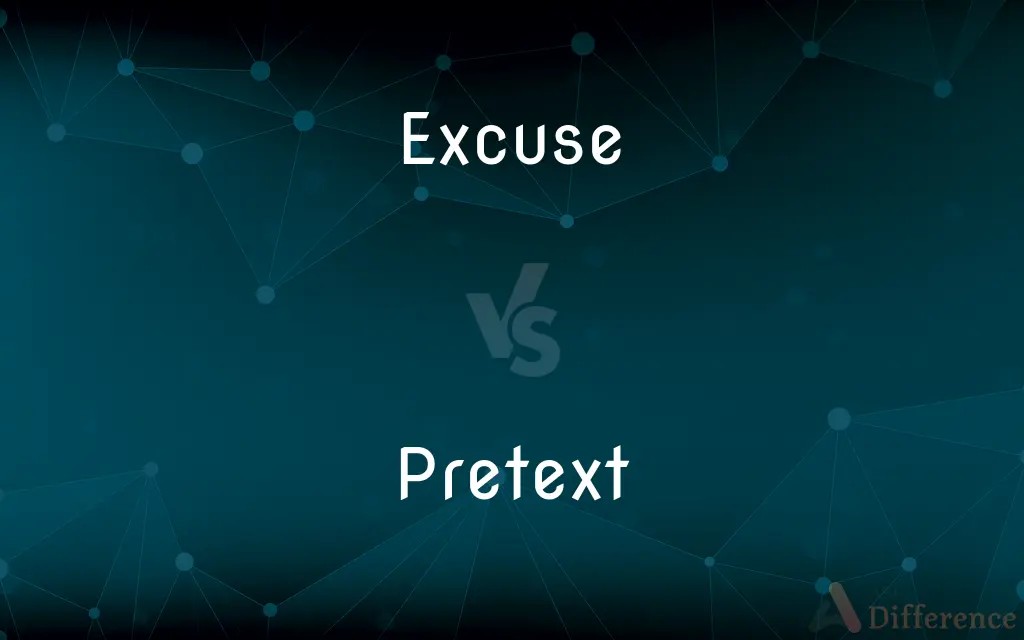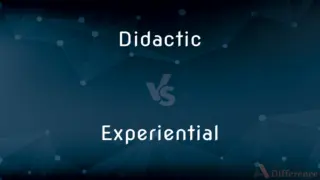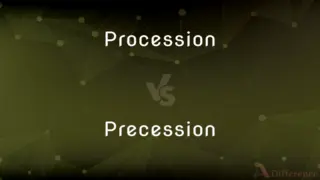Excuse vs. Pretext — What's the Difference?
By Tayyaba Rehman — Updated on September 14, 2023
Excuse refers to a reason given to justify an action or absence, often seeking forgiveness, while pretext is a deceptive reason or motive presented to hide the real intention.

Difference Between Excuse and Pretext
Table of Contents
ADVERTISEMENT
Key Differences
Excuse and Pretext both pertain to reasons given for certain actions or situations. An excuse typically suggests a justification, sometimes genuine, for an oversight or a shortcoming. In contrast, a pretext often carries a deceitful connotation, hiding the actual motive.
People use excuses to explain and often seek understanding or pardon for an action or lack thereof. For instance, one might provide an excuse for arriving late. However, when someone uses a pretext, they might be disguising their real intentions or actions, potentially misleading others.
An excuse may be accepted or rejected based on its credibility. In many cases, excuses stem from unforeseen circumstances or genuine reasons. Pretext, on the other hand, is generally construed as insincere, devised to cloak the true reason.
Schools or workplaces often ask for excuses when someone misses a day, looking for legitimate reasons. A pretext, conversely, could be used in situations where one might have ulterior motives, such as justifying an action that might not be well-received if the real motive was known.
While both terms revolve around reasons or explanations, excuse leans more towards justification and understanding, and pretext edges towards deceit and concealment.
ADVERTISEMENT
Comparison Chart
Definition
Justification for an action
Deceptive reason to conceal intentions
Connotation
Can be genuine or fabricated
Typically insincere
Acceptance
Based on credibility
Generally viewed with suspicion
Usage
Explaining shortcomings
Hiding true motives
Contextual Preference
Casual, academic, professional
Strategic, often in deceptive contexts
Compare with Definitions
Excuse
A means to lessen blame.
He had no valid excuse for his mistakes.
Pretext
A pretense or subterfuge.
He approached under the pretext of friendship.
Excuse
To allow to leave.
The teacher excused the student early.
Pretext
A false appearance or ostensible reason.
She visited under the pretext of seeking advice.
Excuse
In jurisprudence, an excuse is a defense to criminal charges that is distinct from an exculpation. Justification and excuse are different defenses in a criminal case (See Justification and excuse).
Pretext
An excuse made to disguise real intentions.
The official story was just a pretext for the invasion.
Excuse
To make allowance for; overlook or forgive
Please excuse the interruption.
Pretext
A deceptive reason given to conceal true motives.
He used the charity as a pretext for tax evasion.
Excuse
To grant pardon to; forgive
We quickly excused the latecomer.
Pretext
An ostensible motive offered as a cover for hidden intentions.
The meeting was a mere pretext for an ambush.
Excuse
To apologize for (oneself) for an act that could cause offense
She excused herself for being late.
Pretext
A pretext (adj: pretextual) is an excuse to do something or say something that is not accurate. Pretexts may be based on a half-truth or developed in the context of a misleading fabrication.
Excuse
To explain (a fault or offense) in the hope of being forgiven or understood; try to justify
He arrived late and excused his tardiness by blaming it on the traffic.
Pretext
A reason given in justification of a course of action that is not the real reason
The rebels had the perfect pretext for making their move
He called round on the pretext of asking after her mother
Excuse
To serve as justification for
Witty talk does not excuse bad manners.
Pretext
A reason or excuse given to hide the real reason for something.
Excuse
To free, as from an obligation or duty; exempt
She was excused from jury duty because she knew the plaintiff.
Pretext
A false, contrived, or assumed purpose or reason; a pretense.
The reporter called the company on the pretext of trying to resolve a consumer complaint.
Excuse
To give permission to leave; release
The child ate quickly and asked to be excused.
Pretext
To employ a pretext, which involves using a false or contrived purpose for soliciting the gain of something else.
The spy obtained his phone records using possibly-illegal pretexting methods.
Excuse
An explanation offered to justify or obtain forgiveness.
Pretext
Ostensible reason or motive assigned or assumed as a color or cover for the real reason or motive; pretense; disguise.
They suck the blood of those they depend on, under a pretext of service and kindness.
With how much or how little pretext of reason.
Excuse
A reason or grounds for excusing
Ignorance is no excuse for breaking the law.
Pretext
Something serving to conceal plans; a fictitious reason that is concocted in order to conceal the real reason
Excuse
The act of excusing.
Pretext
An artful or simulated semblance;
Under the guise of friendship he betrayed them
Excuse
A note explaining an absence.
Excuse
(Informal) An inferior example
A poor excuse for a poet.
A sorry excuse for a car.
Excuse
(transitive) To forgive; to pardon.
I excused him his transgressions.
Excuse
(transitive) To allow to leave, or release from any obligation.
May I be excused from the table?
I excused myself from the proceedings to think over what I'd heard.
Excuse
(transitive) To provide an excuse for; to explain, with the aim of alleviating guilt or negative judgement.
You know he shouldn't have done it, so don't try to excuse his behavior!
Excuse
To relieve of an imputation by apology or defense; to make apology for as not seriously evil; to ask pardon or indulgence for.
Excuse
Explanation designed to avoid or alleviate guilt or negative judgment; a plea offered in extenuation of a fault.
Tell me why you were late – and I don't want to hear any excuses!
Excuse
(legal) A defense to a criminal or civil charge wherein the accused party admits to doing acts for which legal consequences would normally be appropriate, but asserts that special circumstances relieve that party of culpability for having done those acts.
Excuse
An example of something that is substandard or of inferior quality.
That thing is a poor excuse for a gingerbread man. Hasn't anyone taught you how to bake?
He's a sorry excuse for a doctor.
Excuse
To free from accusation, or the imputation of fault or blame; to clear from guilt; to release from a charge; to justify by extenuating a fault; to exculpate; to absolve; to acquit.
A man's persuasion that a thing is duty, will not excuse him from guilt in practicing it, if really and indeed it be against Gog's law.
Excuse
To pardon, as a fault; to forgive entirely, or to admit to be little censurable, and to overlook; as, we excuse irregular conduct, when extraordinary circumstances appear to justify it.
I must excuse what can not be amended.
Excuse
To regard with indulgence; to view leniently or to overlook; to pardon.
And in our own (excuse some courtly stains.)No whiter page than Addison remains.
Excuse
To free from an impending obligation or duty; hence, to disengage; to dispense with; to release by favor; also, to remit by favor; not to exact; as, to excuse a forfeiture.
I pray thee have me excused.
Excuse
To relieve of an imputation by apology or defense; to make apology for as not seriously evil; to ask pardon or indulgence for.
Think ye that we excuse ourselves to you?
Excuse
The act of excusing, apologizing, exculpating, pardoning, releasing, and the like; acquittal; release; absolution; justification; extenuation.
Pleading so wisely in excuse of it.
Excuse
That which is offered as a reason for being excused; a plea offered in extenuation of a fault or irregular deportment; apology; as, an excuse for neglect of duty; excuses for delay of payment.
Hence with denial vain and coy excuse.
Excuse
That which excuses; that which extenuates or justifies a fault.
If eyes were made for seeing.Then beauty is its own excuse for being.
Excuse
A defense of some offensive behavior or some failure to keep a promise etc.;
He kept finding excuses to stay
Every day he had a new alibi for not getting a job
His transparent self-justification was unacceptable
Excuse
A note explaining an absence;
He had to get his mother to write an excuse for him
Excuse
A poor example;
It was an apology for a meal
A poor excuse for an automobile
Excuse
Accept an excuse for;
Please excuse my dirty hands
Excuse
Grant exemption or release to;
Please excuse me from this class
Excuse
Serve as a reason or cause or justification of;
Your need to sleep late does not excuse your late arrival at work
Her recent divorce amy explain her reluctance to date again
Excuse
Defend, explain, clear away, or make excuses for by reasoning;
Rationalize the child's seemingly crazy behavior
He rationalized his lack of success
Excuse
Ask for permission to be released from an engagement
Excuse
Excuse, overlook, or make allowances for; be lenient with;
Excuse someone's behavior
She condoned her husband's occasional infidelities
Excuse
A reason given to justify an action or absence.
My main excuse for being late was the heavy traffic.
Excuse
A plea to be released from a duty.
She made an excuse to avoid the meeting.
Excuse
To forgive someone for a fault or offense.
I hope you can excuse my tardiness.
Common Curiosities
How does Pretext differ from Excuse?
Pretext is a deceptive reason given to conceal real intentions.
Can an Excuse be genuine?
Yes, excuses can be both genuine and fabricated.
Is Pretext always deceptive?
Typically, pretext has a deceptive connotation, hiding actual motives.
Is it negative to give an Excuse?
Not always; it depends on the context and the genuineness of the excuse.
Can you "make" an Excuse?
Yes, people often "make" excuses to explain their actions.
How do you know if an Excuse is valid?
It's based on the credibility of the reason and the context.
Are pretexts used in politics?
Yes, pretexts can be used in politics to justify actions or strategies.
What does Excuse mean?
An excuse refers to a reason provided to justify an action or shortcoming.
Why is Pretext often viewed with suspicion?
Because it usually hides the actual reason or intention.
Can Pretext ever be genuine?
By definition, pretext leans towards insincerity and deceit.
Is using a Pretext harmful?
It can be, especially if it leads to deception or harm.
Is an Excuse a lie?
Not necessarily; excuses can be true or fabricated.
Can schools ask for an Excuse?
Yes, schools often request excuses for absences or late assignments.
Why would someone use a Pretext?
People use pretexts to disguise their true motives or intentions.
Can an Excuse be a Pretext?
An insincere excuse can serve as a pretext.
Share Your Discovery

Previous Comparison
Didactic vs. Experiential
Next Comparison
Procession vs. PrecessionAuthor Spotlight
Written by
Tayyaba RehmanTayyaba Rehman is a distinguished writer, currently serving as a primary contributor to askdifference.com. As a researcher in semantics and etymology, Tayyaba's passion for the complexity of languages and their distinctions has found a perfect home on the platform. Tayyaba delves into the intricacies of language, distinguishing between commonly confused words and phrases, thereby providing clarity for readers worldwide.















































